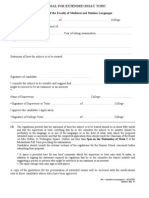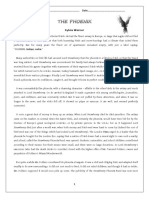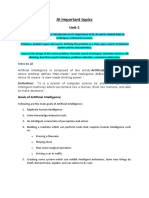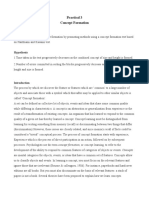Chapter 9: Areas of Knowledge - Human Sciences
Chapter 9: Areas of Knowledge - Human Sciences
Uploaded by
Nimisha SharmaCopyright:
Available Formats
Chapter 9: Areas of Knowledge - Human Sciences
Chapter 9: Areas of Knowledge - Human Sciences
Uploaded by
Nimisha SharmaOriginal Title
Copyright
Available Formats
Share this document
Did you find this document useful?
Is this content inappropriate?
Copyright:
Available Formats
Chapter 9: Areas of Knowledge - Human Sciences
Chapter 9: Areas of Knowledge - Human Sciences
Uploaded by
Nimisha SharmaCopyright:
Available Formats
Theory of Knowledge for the IB Diploma
Chapter 9: Areas of knowledge – Human sciences (p. 256)
The human sciences include psychology, economics and anthropology.
Human sciences study human behaviour in a systematic way based on observation, and seek to
discover laws and theories.
Features almost unique to humans include:
• the mirror test: humans (and some chimpanzees) recognise themselves in a mirror
• language
• reason
• free-will
• creativity.
Discussion: Activity 9.1, p. 258
Observation (p. 258)
Problems:
• You cannot observe people’s minds or their actual thinking.
• People tend to overestimate their strengths and underestimate their weaknesses, e.g. in a study
of one million US high school students, all ranked themselves above average in their ability
to get on with others.
Loaded questions (p. 259)
Some questions have hidden assumptions that encourage a particular answer. If you ask questions
with skill you may be able to make people give the answer you want.
Discussion: Activity 9.3, p. 259
The observer effect (p. 261)
Being observed may change people’s behaviour.
Discussion: Activity 9.4, p. 261
Habituation is used to overcome the observer effect: e.g. anthropologists may ‘go native’ so the
observed eventually behave normally.
© Cambridge University Press 2011 Page 1 of 6
Theory of Knowledge for the IB Diploma
Expectations may influence behaviour, e.g.:
Psychology
• An experiment divided children randomly into two groups: bright and less bright.
• The ‘bright’ group made more progress in the following year (due to higher teacher
expectations?).
Discussion: Activity 9.5, p. 263
Economics
• People’s expectations affect the stock market.
Discussion: Activity 9.6, p. 263
Anthropology
• It is claimed that witch doctor spells can make people die (voodoo death).
• One explanation for this is that people in certain cultures are conditioned from birth to expect
voodoo to work.
Discussions: Activities 9.7 and 9.8, p. 264
Measurement (pp. 264–7)
Differing use of statistics can change the interpretation of results of experiments.
Discussion: Activity 9.10, p. 267
Some things are not measurable on a common scale so are difficult to compare.
Discussion: Activity 9.11, p. 267
© Cambridge University Press 2011 Page 2 of 6
Theory of Knowledge for the IB Diploma
Experiments (pp. 268–70)
Difficulties of conducting experiments in social science
Human scientists operate in a situation where it is impossible to run controlled experiments because:
• there may be too many variables
• the artificiality of experiments may change behaviour
• ethics may prevent experiments that have a negative effect on people.
Human scientists may have to wait for nature to provide the appropriate experimental conditions, e.g.
economic history can provide experimental data; we can learn something about normal brain
functions by looking at people who have suffered brain damage.
The Milgram experiment
• Actors played the role of unseen (but heard) learners, strapped to a chair with electrodes on
their wrists.
• Volunteers acted as teachers. They saw the learners strapped in and were then taken to
another room.
• Teachers asked the learners memory test questions.
• Teachers were told to punish false answers with increasing levels of electric shocks, labelled
slight shock, strong shock, intense shock, danger.
120 volts → learner complained*
150 volts → learner demanded that experiment be stopped*
270 volts → learner screamed*
330 volts → ominous silence
(* It was just an actor pretending!)
• If a teacher hesitated, they were a) told by a scientist that it was important to continue the
experiment, and b) reassured that they would not be held responsible.
• Result: almost two-thirds of the volunteers continued to 450 volts. Many expressed concern
about what they were doing, but still didn’t refuse to continue.
• However, if paired with two other actor-teachers who rebelled, only 10% of volunteers
continued to 450 volts.
• This poses serious questions about human nature and our willingness to follow orders.
• Questions about the ethics of the experiment were also raised – the volunteers were misled
about what they were doing, and may have suffered from a permanent loss of self-esteem.
Discussions: Activities 9.13 and 9.14, pp. 269, 270
© Cambridge University Press 2011 Page 3 of 6
Theory of Knowledge for the IB Diploma
Laws (p. 270)
Human predictability
The idea of human free-will seems to conflict with the idea of human behaviour conforming to
predictable laws.
Discussion: Activity 9.15, p. 270
The law of large numbers
• In a large population random variations tend to cancel out anomalies.
• This enables us to predict group behaviour.
• However, the behaviour of an individual cannot be predicted with any certainty.
Discussion: Activity 9.16, p. 271
Trends and laws (p. 271)
• Human sciences do not have a good record of prediction, e.g. demographers do not agree
about the size of world population in 50 years’ time.
• In 1973 Paul Ehrlich predicted that there would be 65 million starving Americans by 1990
(which ironically turned out to be the number of Americans who were overweight in 1990)!
• Economic forecasters also often get it wrong. The Phillips curve seemed to work in theory but
when applied to reality it broke down.
• The fallacy of post hoc ergo propter hoc (see Chapter 5): just because two things correlate,
the first is not necessarily the cause of the second.
Discussion: Activity 9.17, p. 272
The complexity of real-world situations (p. 272)
• In real life there is a complex web of causes, effects and combinations of both.
• Because of free-will people do not always do what you expect them to do.
Summary: the role of laws in human sciences (p. 273)
• The law of large numbers means we can sometimes make accurate predictions about the
behaviour of a large population.
• However, predictions based on past trends can be unreliable forecasters of the future.
• The complexity of the real world makes it difficult to unearth reliable simple laws.
© Cambridge University Press 2011 Page 4 of 6
Theory of Knowledge for the IB Diploma
The relationship between natural and human sciences (p. 273)
Ernest Rutherford (1871–1937): ‘The only possible conclusion the social sciences can draw is: some
do, some don’t.’
Discussion: Activity 9.18, p. 274
Reductionism (p. 274)
Basis:
Social science may one day be supported by advances in natural sciences, such as physics. For
example:
Economics → explained by psychology → explained by neuroscience → explained by physics
Criticisms:
• The reductive fallacy is the fallacy of saying that just because A is composed of B, it follows
that A is nothing but B, e.g. a human being is nothing but a bunch of chemicals.
• There are good reasons for doubting this approach – when simple things are combined the
results cannot always be predicted.
• It therefore seems unlikely that we will ever be able to explain the human sciences in terms of
physics.
Holism (p. 275)
Basis:
The whole is greater than the sum of the parts – that is, the whole contains elements that cannot be
analysed by examination of the parts, e.g.:
• parts of a cat do not work unless in a live cat
• groups react differently from individuals.
Discussion: Activity 9.19, p. 276
The Verstehen position (p. 276)
Verstehen = German for ‘understanding’
Social practices (e.g. traffic rules, sports) cannot be determined from the study of atoms and
molecules. They can only be understood from inside the group.
Discussion: Activity 9.20, p. 277
© Cambridge University Press 2011 Page 5 of 6
Theory of Knowledge for the IB Diploma
Since human sciences are explained in terms of meaning (rather than mechanism):
• meaning may depend on context
• unintended consequences of actions need to be taken into account
• it is therefore difficult to generalise into universal laws.
Criticism: Some human traits do seem to be universal and independent of culture, e.g. gossiping,
joking.
The problem of ‘confirmation bias’ (p. 278)
Researchers may just look for evidence to support pre-existing ideas. (See also Chapter 8.)
Predictions (p. 279)
• There are too many variables in social science to be able to make accurate predictions.
• Some predictions made by social scientists are valuable in that they may stimulate us to try to
prevent possible negative situations in the future.
• Verstehen: the purpose of human sciences is to understand, not to explain/predict.
Discussion: Activity 9.24, p. 280
See also:
Linking questions: p. 282
Reading resources:
(Teachers may wish to set their own assignments on these.)
Soft sciences are often harder than hard sciences p. 283
Is economics a science? p. 286
© Cambridge University Press 2011 Page 6 of 6
You might also like
- A Critical Analysis of Arguments (Most Recent)Document3 pagesA Critical Analysis of Arguments (Most Recent)diddy_8514No ratings yet
- Denying Science: Reflections on Those Who Refuse to Accept the Results of Scientific StudiesFrom EverandDenying Science: Reflections on Those Who Refuse to Accept the Results of Scientific StudiesNo ratings yet
- Foreign by Carol Ann DuffyDocument1 pageForeign by Carol Ann DuffyhelenNo ratings yet
- Humanl Sciences Linking Qs DiagramDocument1 pageHumanl Sciences Linking Qs Diagramapi-202268486100% (1)
- A Doll's House Notes About Symbolic Meaning of Lamp EtcDocument3 pagesA Doll's House Notes About Symbolic Meaning of Lamp Etcjunaid ashrafNo ratings yet
- 18 Scientific Claims An African PerspectiveDocument4 pages18 Scientific Claims An African PerspectiveSandy SaddlerNo ratings yet
- IB Extended Essay FINALDocument31 pagesIB Extended Essay FINALAmber WestlundNo ratings yet
- TOK Essay May 2025 Title 1 GuideDocument3 pagesTOK Essay May 2025 Title 1 GuideNthisana Nthulanyane100% (1)
- Commentaries SampleDocument10 pagesCommentaries SamplePranav Reddy100% (1)
- IB B Internal Assessment Preparation BookletDocument4 pagesIB B Internal Assessment Preparation BookletGustavo ASNo ratings yet
- Mrs Sisyphus 1Document4 pagesMrs Sisyphus 1Sayali YadavNo ratings yet
- Mrs SisyphusDocument4 pagesMrs Sisyphusapi-462898738No ratings yet
- 2005 English Exam Assessment ReportDocument11 pages2005 English Exam Assessment Reportpinkangel2868_142411No ratings yet
- Oedipus The King - Knowledge OrganiserDocument2 pagesOedipus The King - Knowledge OrganiserCarlyNo ratings yet
- IB Theory of Knowledge EssayDocument6 pagesIB Theory of Knowledge Essayjiani dengNo ratings yet
- Infinities of Being A HousewifeDocument3 pagesInfinities of Being A Housewifekrishna patel0% (1)
- 1984 Unit PlanDocument11 pages1984 Unit Planapi-313091915No ratings yet
- Loneliness Is A Dominant Theme in of Mice and MenDocument2 pagesLoneliness Is A Dominant Theme in of Mice and MenNabid GhafferNo ratings yet
- Tok Key TermsDocument10 pagesTok Key Termspixler1602No ratings yet
- Medusa AnalysisDocument20 pagesMedusa AnalysisArsenia LotivoNo ratings yet
- Language A AssessmentDocument75 pagesLanguage A AssessmentRadia Loulou100% (1)
- The Mask You Live in (Practice HL Essay)Document6 pagesThe Mask You Live in (Practice HL Essay)Kanon SuzukiNo ratings yet
- Higher Level Essay:: HL Essay Example C: Student WorkDocument3 pagesHigher Level Essay:: HL Essay Example C: Student WorkGavin Donnelly100% (1)
- AI Magazine - Spring 1985 - Briggs - Knowledge Representation in Sanskrit and Artificial IntelligenceDocument8 pagesAI Magazine - Spring 1985 - Briggs - Knowledge Representation in Sanskrit and Artificial IntelligencePranshu BararNo ratings yet
- Proposal For Extended Essay TopicDocument3 pagesProposal For Extended Essay TopicAhmadBalqiaZainulAbidinNo ratings yet
- The Phoenix PDFDocument3 pagesThe Phoenix PDFAnaliadomiNo ratings yet
- Alarm Paragraph Structure Model Pats CuriousDocument3 pagesAlarm Paragraph Structure Model Pats Curiousapi-331074548No ratings yet
- The Things They Carried Ib Summer AssignmentDocument9 pagesThe Things They Carried Ib Summer Assignmentapi-462884787No ratings yet
- Personal Helicon LitChartDocument18 pagesPersonal Helicon LitCharth1110715No ratings yet
- IOC The Road and Handmaid's Tale (Hotaru)Document5 pagesIOC The Road and Handmaid's Tale (Hotaru)HotaruNo ratings yet
- Transition LessonDocument13 pagesTransition LessonnabilNo ratings yet
- Portrayal of Women and Their Mental Trauma in The Patriarchal Society Through The Play Kamala' by Vijay Dhondopant TendulkarDocument3 pagesPortrayal of Women and Their Mental Trauma in The Patriarchal Society Through The Play Kamala' by Vijay Dhondopant TendulkarIJELS Research JournalNo ratings yet
- Gwen Harwood-Poetry Analysis: by Lucas Aoun (Lokzo)Document15 pagesGwen Harwood-Poetry Analysis: by Lucas Aoun (Lokzo)technowiz11No ratings yet
- HIGHLIGHTED The Bat P1 Poetry Sample SL 2020-21Document5 pagesHIGHLIGHTED The Bat P1 Poetry Sample SL 2020-21yolandaliu24No ratings yet
- Reading Fred D'Aguaire FertigDocument30 pagesReading Fred D'Aguaire FertigNicolas LamoureNo ratings yet
- Writing Unseen Commentaries Student Edition PDFDocument231 pagesWriting Unseen Commentaries Student Edition PDFterabaapNo ratings yet
- LiteratureDocument20 pagesLiteratureKirthika JaganNo ratings yet
- Extended Essay in Visual Arts StudentsDocument9 pagesExtended Essay in Visual Arts Studentsapi-279889431No ratings yet
- Ibdp Handbook - Class of 2025Document79 pagesIbdp Handbook - Class of 2025shilpa SNo ratings yet
- English A2 Paper 1 HLDocument5 pagesEnglish A2 Paper 1 HLMiyu BansalNo ratings yet
- EE Film Disney PrincessDocument20 pagesEE Film Disney PrincessElzNo ratings yet
- Life of Pi - Yann Martel (Part 1) SummaryDocument20 pagesLife of Pi - Yann Martel (Part 1) SummaryUrifunarothe RambudaNo ratings yet
- Year 9 PEEL Paragraph GuideDocument5 pagesYear 9 PEEL Paragraph GuideDavid JebakumarNo ratings yet
- War Poetry Assignment SheetDocument4 pagesWar Poetry Assignment Sheetapi-249815522100% (1)
- Geography IA 1Document10 pagesGeography IA 1nadeemyakubu47No ratings yet
- Dove Ad Campaign Ib Lang 11Document4 pagesDove Ad Campaign Ib Lang 11api-522569410No ratings yet
- Buzzard Breath & Brains: by James MoloneyDocument19 pagesBuzzard Breath & Brains: by James Moloneyindyglow100% (1)
- Robert GrayDocument3 pagesRobert Grayoiu7hjjs100% (1)
- How Does Pleasantville Use Satire To Comment On Social IssuesDocument3 pagesHow Does Pleasantville Use Satire To Comment On Social IssuesHope MarieNo ratings yet
- What Constraints Are There On The Pursuit of Knowledge?Document3 pagesWhat Constraints Are There On The Pursuit of Knowledge?Mohsin AhmadNo ratings yet
- F451 Section 1 QuestionsDocument5 pagesF451 Section 1 QuestionsJulia Negrete (Student)No ratings yet
- CatrinDocument14 pagesCatrinapi-351102904No ratings yet
- Self Potrait With Thorn Necklace and Humming Bird (1940)Document2 pagesSelf Potrait With Thorn Necklace and Humming Bird (1940)Alhussan SchoolNo ratings yet
- Subject Title (2021-22) : Economics For The IB Diploma Coursebook With Digital Access (2 Years)Document4 pagesSubject Title (2021-22) : Economics For The IB Diploma Coursebook With Digital Access (2 Years)Desmos GamerNo ratings yet
- Commentary On "After The Flood" W.S MerwinDocument3 pagesCommentary On "After The Flood" W.S MerwinsticktoriaNo ratings yet
- Text 13A IGCSE FLEDocument2 pagesText 13A IGCSE FLEbiboboynotgayNo ratings yet
- Character Analysis of Aunt AlexandraDocument4 pagesCharacter Analysis of Aunt AlexandraranjiangNo ratings yet
- LitCharts The Storm WindDocument7 pagesLitCharts The Storm Windemo musical nerdNo ratings yet
- Biology Paper 1 SLDocument12 pagesBiology Paper 1 SLesteban1013264503No ratings yet
- Click Here To Read Answers: Scanned by CamscannerDocument1 pageClick Here To Read Answers: Scanned by CamscannerNimisha SharmaNo ratings yet
- Ipjugaad - BCA 6th Sem Artificial Intelligence Paper 2018Document2 pagesIpjugaad - BCA 6th Sem Artificial Intelligence Paper 2018Nimisha SharmaNo ratings yet
- AI Notes-NimishaDocument35 pagesAI Notes-NimishaNimisha SharmaNo ratings yet
- Unit 1Document167 pagesUnit 1Nimisha SharmaNo ratings yet
- Code It QuestionsDocument3 pagesCode It QuestionsNimisha SharmaNo ratings yet
- International Baccalaureate Diploma Programme Subject Brief: Mathematics: Mathematical Studies - Standard LevelDocument2 pagesInternational Baccalaureate Diploma Programme Subject Brief: Mathematics: Mathematical Studies - Standard LevelNimisha SharmaNo ratings yet
- MathsDocument2 pagesMathsNimisha SharmaNo ratings yet
- Ayurveda: AromatherpyDocument2 pagesAyurveda: AromatherpydeshanpNo ratings yet
- Stages in Human DevelopmentDocument1 pageStages in Human DevelopmentTOt's VinNo ratings yet
- EYLF Planning Cycle A3Document1 pageEYLF Planning Cycle A3darkclawsNo ratings yet
- Research Final Part 1Document5 pagesResearch Final Part 1dolly kate cagadasNo ratings yet
- Fun Theory StairsDocument19 pagesFun Theory StairsCarla Lourraine TanNo ratings yet
- Evaluating Sales Force PerformanceDocument3 pagesEvaluating Sales Force PerformanceShilpy Ravneet KaurNo ratings yet
- Counseling Skills For Teachers 1Document22 pagesCounseling Skills For Teachers 1Aubrey Borja50% (2)
- PSY - 101 Project Work Analyzing Fair & Lovely' TVC Summer - 2020Document4 pagesPSY - 101 Project Work Analyzing Fair & Lovely' TVC Summer - 2020Rakib HasanNo ratings yet
- Assignment Part 1: Direct Speech Numbe R Reported SpeechDocument4 pagesAssignment Part 1: Direct Speech Numbe R Reported SpeechOmar Martinez PNo ratings yet
- TOS - English 7 Q3Document4 pagesTOS - English 7 Q3Nina Hannah Trixia BajoNo ratings yet
- Dissociative DisordersDocument27 pagesDissociative DisordersShielamae PalalayNo ratings yet
- Millon OnlineDocument20 pagesMillon OnlineCristina SelNo ratings yet
- Counselling Children - IntroductionDocument10 pagesCounselling Children - IntroductionJavier EclécticoNo ratings yet
- An Overview of The DSM-5 Alternative Model of Personality DisordersDocument7 pagesAn Overview of The DSM-5 Alternative Model of Personality DisordersJosé Ignacio SáezNo ratings yet
- Communication Styles Role PlayDocument3 pagesCommunication Styles Role Playmahima sajanNo ratings yet
- Understand Risky ShiftDocument26 pagesUnderstand Risky ShiftSreekumar GopalakrishnanNo ratings yet
- Online 1 Philosophy and PsychoDocument2 pagesOnline 1 Philosophy and PsychoEric Alden ApoleNo ratings yet
- A Framework For Comparing Theories Related To Motivation in EducationDocument30 pagesA Framework For Comparing Theories Related To Motivation in EducationBulqia MasudNo ratings yet
- Hypnosis and HypnotisabilityDocument17 pagesHypnosis and HypnotisabilityimilagiNo ratings yet
- Practical 3 Concept Formation: PurposeDocument9 pagesPractical 3 Concept Formation: PurposeSehaj Bedi100% (5)
- IOM Aot ReviewerDocument3 pagesIOM Aot ReviewerJaymar M. JaminNo ratings yet
- Psychology of A Juvenile Turning Into Criminal and Other FactorsDocument7 pagesPsychology of A Juvenile Turning Into Criminal and Other FactorsSuvarna RekhaNo ratings yet
- The Effect of Anxiety and Depression On College Students - AcademiDocument77 pagesThe Effect of Anxiety and Depression On College Students - AcademiRizza Joy VertusoNo ratings yet
- Exploring Career PathwaysDocument2 pagesExploring Career PathwaysrotajessicabsaNo ratings yet
- BarsDocument3 pagesBarssogatNo ratings yet
- Juvenile Delinquency and Crime PreventionDocument9 pagesJuvenile Delinquency and Crime PreventionJoshua D None-NoneNo ratings yet
- "Talent Is Never Enough": Book of The MonthDocument4 pages"Talent Is Never Enough": Book of The MonthvikasaaNo ratings yet
- 72 Names of God MeditationDocument12 pages72 Names of God Meditationparizad100% (9)
- OutlineDocument3 pagesOutlinerabia khalidNo ratings yet
- BigValuesList Poster A2Document1 pageBigValuesList Poster A2EnriquePalaciosLopez100% (1)
































































































